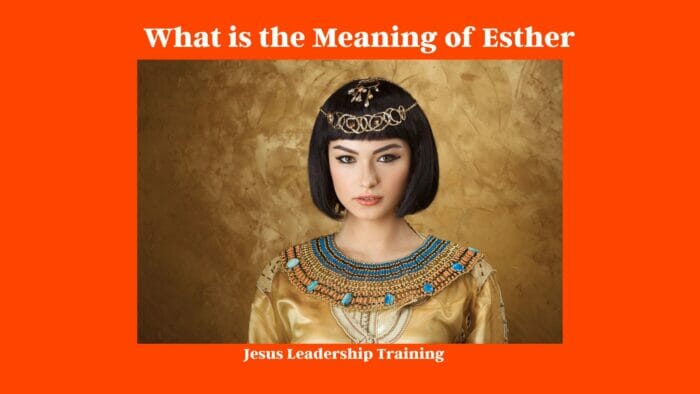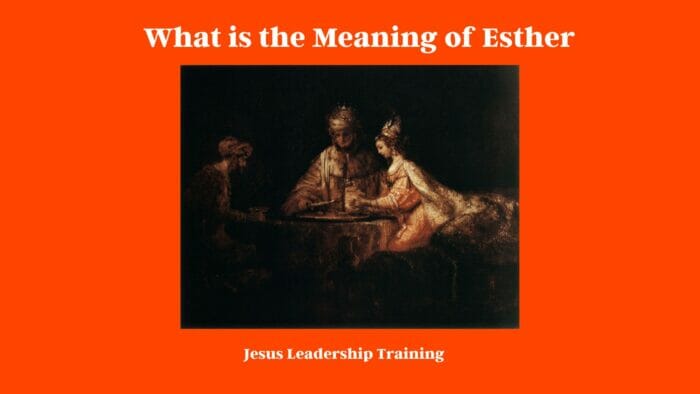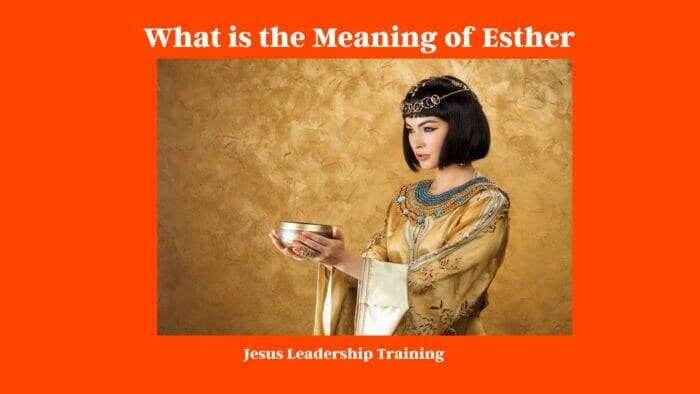What is the Spiritual Meaning of Esther – The task of understanding the essence and depth of a name often resembles deciphering an intricate puzzle. One such enigmatic and rich name is “Esther”. Originating from ancient roots and carrying profound significance, it’s high time we take a magnifying glass to the question, “What is the meaning of Esther?”
Table of Contents
What is the Spiritual Meaning of Esther
Origins of the Name
Esther is a name with deep historical roots. Originating in the ancient world, its traces can be found in two distinct cultures: the Persians and the Hebrews. Each culture attributes a different meaning to Esther, contributing to its layered and intriguing character.
The Persian interpretation of Esther connects it with stara, meaning “star.” An apt metaphor, as stars have been guides, dream-inspirers, and symbols of celestial beauty across cultures.
On the other hand, the Hebrew variant of the name is Hadassah, which translates to “myrtle,” a plant symbolizing beauty and fertility. How did Hadassah morph into Esther? The story lies in the annals of Jewish history.
15 Remarkable Women Bible Characters: Their Stories and Impact | Bible | Women
From Hadassah to Esther: A Tale of Courage and Beauty
In the Old Testament of the Bible, Hadassah was a young Jewish woman of extraordinary beauty. She changed her name to Esther to conceal her Jewish identity when she became the Queen of Persia. Her name change and royal ascension set the stage for a tale of courage, cunning, and salvation that still inspires people worldwide.

Names that come from the Persian Name Esther (Star) (Baby) (Baby Names)
Sure, “Esther” is a name of Persian origin, although it’s also found in the Bible. Here’s a list of names that have a similar origin or are related to the name “Esther” in some way:
| Name | Gender | Origin | Meaning |
|---|---|---|---|
| Esther | Female | Persian, Hebrew | “Star” or “hidden” |
| Hadassah | Female | Hebrew | Myrtle tree”, Esther’s Hebrew name in the Bible |
| Astra | Female | Greek | “Star” |
| Astara | Female | Persian | “Star”, similar to Esther |
| Estrella | Female | Spanish | “Star” |
| Hester | Female | English, Hebrew | Variant of Esther |
| Estee | Female | Hebrew, French | Diminutive form of Esther |
| Star | Female | English | Derived from the meaning of Esther |
| Sitara | Female | Persian, Hindi | “Star” |
| Seren | Female | Welsh | “Star” |
Please note that while all these names are in some way connected to “Esther”, they do not necessarily have the same cultural or historical connotations.

Famous Women that have been Named Esther
the name Esther has been borne by many notable women in various fields. Here’s a list of some of them:
| Name | Profession/Contribution |
|---|---|
| Esther Williams | American competitive swimmer and actress |
| Esther Rolle | American actress known for her role in the TV series “Good Times” |
| Esther Duflo | French-American economist, co-recipient of the 2019 Nobel Prize in Economics |
| Esther Peterson | American consumer and women’s advocate |
| Esther Phillips | American singer and Grammy nominee |
| Esther Perel | Belgian psychotherapist, popular for her research on human relationships |
| Esther Earl | American author, recognized for inspiring John Green’s “The Fault in Our Stars” |
| Esther Greenwood | The protagonist in Sylvia Plath’s semi-autobiographical novel “The Bell Jar” |
| Esther Canadas | Spanish model and actress |
| Esther Vergeer | Dutch wheelchair tennis player, one of the most successful in the sport’s history |

Please note that some of these are historical figures, while others are still active in their respective fields.
Biblical Significance of Esther (Named Esther)
Esther in the Bible
The Book of Esther in the Old Testament brings the captivating story of Queen Esther to life. But her tale isn’t just a romantic narrative of a common girl becoming a queen. It’s a story of resilience, courage, and the pivotal role she played in saving her people from a mass genocide.
Lessons from Esther’s Story
Esther’s story is steeped in lessons of faith, bravery, and strategic wisdom. Her tale teaches us that even in the face of adversity, one can wield courage and wisdom to affect significant change.
Through her story, we learn that sometimes it’s necessary to conceal our true selves to achieve a higher purpose, much like Esther concealing her Jewish identity initially. However, when the moment of truth arrives, one must stand firm in their identity and principles, just as Esther did when she revealed her origins to save her people.
Spiritual Lesson that can be Learned from Studying the Life of Queen Esther
Queen Esther’s life, as told in the Bible, holds many lessons that could be considered spiritual. Here’s a table summarizing some of these key lessons:
| Lesson | Explanation |
|---|---|
| Courage in the Face of Adversity | Despite the danger to her own life, Esther bravely approached the king to save her people. This teaches the value of courage and self-sacrifice. |
| Faith in God’s Plan | Esther’s rise to queen happened at a crucial time when her people needed her influence. This is often interpreted as evidence of God’s providential guidance. |
| The Power of Prayer and Fasting | Before approaching the king, Esther asked the Jews to fast and pray for three days. This shows the importance of spiritual preparation and intercession. |
| The Importance of Identity | Esther was a Jewish woman in a Persian court. Her cultural and religious identity played a crucial role in her life and decisions, emphasizing the value of embracing one’s roots. |
| The Impact of Good Advice | Esther listened to her cousin Mordecai’s advice, which ultimately led to the salvation of the Jewish people. This teaches the importance of heeding wise counsel. |
| Taking Initiative | Esther took the initiative to save her people rather than remaining silent. This encourages individuals to take action when faced with injustice. |
| Humility and Grace | Despite being queen, Esther remained humble and gracious, teaching the importance of these qualities in leadership. |
| The Consequences of Pride | In contrast to Esther, Haman’s pride led to his downfall, offering a cautionary lesson about the dangers of arrogance. |
Cultural Interpretations of the Name Esther
Esther in Judaism
In Jewish culture, Esther is revered as a heroine. Her story is celebrated during the festival of Purim, with readings from the Book of Esther, known as the Megillah. This celebration is a reminder of the Jewish people’s deliverance from destruction in ancient Persia.
Sure, here’s a table that illustrates the significance of Queen Esther in Judaism:
| Aspect | Importance of Esther |
|---|---|
| Heroine of Purim | Esther is the heroine of the Book of Esther and the holiday of Purim. Her courage to stand up for her people in the face of danger is celebrated annually during this holiday. |
| Symbol of Courage | Esther’s bravery in saving the Jewish people from Haman’s plot serves as an enduring symbol of courage and self-sacrifice in Jewish culture. |
| Example of Piety | Esther’s faith in God and commitment to prayer and fasting set an example of piety and spiritual devotion. |
| Role Model for Women | Esther is often viewed as a role model for Jewish women, demonstrating strength, wisdom, and leadership while maintaining her grace and humility. |
| Survival of Jewish People | Esther’s actions ensured the survival of the Jewish people in Persia, underlining the recurring theme in Jewish history of survival against the odds. |
| Fulfillment of Duty | Despite her high position, Esther did not forget her duty towards her people and God. This reminds Jews of the importance of fulfilling one’s duties, regardless of one’s circumstances. |
Esther in Christianity
In Christianity, Esther’s story is a testament to God’s providence. Although God is not explicitly mentioned in the Book of Esther, many Christians see His hand subtly working throughout Esther’s life, leading to the salvation of the Jews.
Absolutely, the following table illustrates the significance of Queen Esther in Christianity:
| Aspect | Importance of Esther |
|---|---|
| Courage and Faith | Esther’s bravery and faith are often highlighted as an example for Christians to follow, showing trust in God even in the face of great danger. |
| God’s Providence | The story of Esther is seen as a powerful testament to God’s providence, His unseen hand guiding events for the benefit of His people. |
| Answered Prayer | Esther’s story emphasizes the power of prayer and fasting, showing how these spiritual disciplines can lead to divine intervention. |
| Female Leadership | Esther is revered as a significant female figure in the Bible who exercised wisdom and leadership, often discussed in the context of women’s roles in the church and society. |
| Stand Against Injustice | Esther’s willingness to risk her life to save her people is a powerful illustration of standing against injustice, a key principle in Christian ethics. |
| Humility and Wisdom | Despite being queen, Esther exhibited humility and wisdom, traits that are greatly valued in Christianity. |
| Obedience to God | Esther’s obedience to Mordecai and God demonstrates the importance of obedience to God’s will, a key principle in Christianity. |
Esther in Modern Usage
The name Esther has been consistently popular across cultures and through the centuries. It embodies beauty, bravery, and wisdom, making it a popular choice for many parents.
What is the Meaning of Esther? A Deeper Look
Esther is more than a simple name. It is a symbol of beauty—like the stars in the Persian night sky or the lush myrtle in the Hebrew fields. It is the embodiment of courage and wisdom, reflected in the biblical Queen Esther who saved her people.
This powerful combination of beauty and bravery gives the name Esther a compelling draw. It encapsulates the journey of a humble girl who became a queen, a concealed Jewess who became a savior, and an ordinary name that carries extraordinary meaning.
FAQs about the Meaning of Esther
1. What is the origin of the name Esther? The name Esther has Persian and Hebrew origins. In Persian, it is derived from stara, meaning “star,” while in Hebrew, it’s related to Hadassah, meaning “myrtle.”
2. Who was Esther in the Bible? Esther, originally named Hadassah, was a Jewish woman who became the Queen of Persia and heroically saved her people from genocide.
3. What is the cultural significance of the name Esther? In both Jewish and Christian traditions, Esther is a symbol of courage, wisdom, and divine providence. Her story is celebrated during the Jewish festival of Purim.
4. What are the values associated with the name Esther? The name Esther is associated with beauty, courage, strategic wisdom, and faith.
5. Why is the name Esther popular today? Esther remains a popular name due to its rich history, spiritual significance, and the values it embodies.
6. What is the core meaning of Esther? The name Esther symbolizes beauty, like a star or a myrtle tree, and bravery, reflecting the biblical tale of Queen Esther.
Final Thoughts – What is the Meaning Of Esther
So, what is the meaning of Esther? It’s a multifaceted name imbued with beauty, strength, and spirituality. From ancient Persia to modern times, Esther has remained a beacon of hope, courage, and strategic wisdom, resonating deeply with people across generations. Much like a star in the night sky, the name Esther continues to shine with an unending light.
Best Old Testament Commentaries
Below is a table featuring some renowned Old Testament commentaries, their publishers, and websites where they can be found. As always, it’s best to confirm availability on multiple platforms or the publishers’ websites.
| Commentary Name | Publisher | Website |
|---|---|---|
| The New International Commentary on the Old Testament | Eerdmans | Eerdmans |
| Word Biblical Commentary | Zondervan | Zondervan |
| Baker Commentary on the Old Testament | Baker Academic | Baker Academic |
| The Anchor Yale Bible Commentary | Yale University Press | Yale University Press |
| Tyndale Old Testament Commentaries | InterVarsity Press | InterVarsity Press |
| Expositor’s Bible Commentary | Zondervan | Zondervan |
| The Old Testament for Everyone | Westminster John Knox Press | Westminster John Knox Press |
Note: As with the New Testament table, this table provides generalized examples and does not list each volume within the commentary series. The commentaries can usually be found on the publishers’ websites or other online book retailers such as Amazon or Christianbook. It is always advisable to check for the most accurate and up-to-date information regarding availability.




